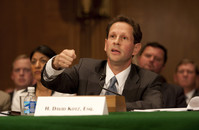Finra Missed Chances to Catch Stanford and Madoff

|
October 2, 2009 By Joshua Gallu, David Scheer and Ian Katz The Financial Industry Regulatory Authority didn't fully probe transactions at Bernard Madoff's firm and repeatedly failed to investigate tips about R. Allen Stanford's alleged $7 billion fraud, an internal report found. |
| David Kotz. | |
|
Employees at the U.S. brokerage industry's main regulator must more aggressively exercise their authority, and escalate
suspicions of serious fraud to senior managers or special investigators, according to the report released today. Finra
said it will create an Office of Fraud Detection and Market Intelligence to ensure that investigators with expertise in
fraud detection can respond rapidly. The report shows regulatory lapses linked to Madoff's record Ponzi scheme weren't confined to the Securities and Exchange Commission, which has been faulted by its own internal watchdog for inadequately pursuing tips over 16 years. In Stanford's case, Finra also received "credible information" from at least five sources, including the SEC, according to the internal report. "As regulators, we owe it to investors -- especially those harmed by recent scandals -- to develop a better, more comprehensive, response to fraud," Finra Chief Executive Officer Richard Ketchum said in a statement. "I am committed to taking the lessons from the report's findings to make Finra even stronger." SEC Chairman Mary Schapiro led Finra and its predecessor NASD from 2006 until taking over the SEC in January this year. During that time, the brokerage regulator conducted some examinations of Madoff's firm and fined Stanford Group Co. The SEC oversees Finra and approves its rules. Jurisdictional Limits In a series of reports this year, SEC Inspector General H. David Kotz has faulted his agency's oversight of Madoff and examined its attempts to investigate Stanford. In the Stanford case, he concluded the SEC was hampered by jurisdictional limits and Stanford's refusal to cooperate. Kotz found that the SEC never fully investigated at least six tips on Madoff since 1992 while he was building a $65 billion Ponzi scheme. While there is no evidence that Finra received similar whistleblower complaints, its examiners did uncover several facts worthy of inquiry that, "with the benefit of hindsight, should have been pursued," the Finra report said. In 2005, the SEC sent a five-page letter to Finra about Stanford. The letter said his certificates of deposit "appear too good to be true" and that his firm had aggressive sales tactics commonly associated with fraudulent schemes. Misinterpretation According to the report, Finra's lead examiner "thought the letter signaled that the SEC had taken over the CD case" when it was actually meant to refer the investigation to Finra. In light of the misinterpretation, the examiner "did not do all he could have done on the CD issue." In 2006, Finra examiners noticed Madoff was making payments to Cohmad Securities Corp., according to the report. Had examiners sought more documents, they might have realized that the fees were for steering clients to Madoff's investment advisory business. Such a discovery "may not have uncovered the Ponzi scheme, but it would have undermined the Madoff firm's longstanding representations" that it didn't have customer accounts, the report said. In 2007, Finra staff uncovered commissions from a London affiliate that criminal investigators have linked to money laundering, according to the report. If examiners had fully scrutinized the transactions, they may have fueled suspicions and prompted a broader investigation, it said. Anonymous Letter In 2003, Finra received an anonymous letter calling Stanford's business a "massive Ponzi scheme that will destroy the life savings of many." The letter was not seen by the organization's enforcement staff until six years later after an analyst determined Stanford's CDs were not securities and therefore outside of Finra's jurisdiction, the report said. The analyst referred the letter to the SEC. "By more aggressively using its authority, Finra could have obtained evidence of wrongdoing much earlier than it did," the report said. If examiners had fully pursued information that Stanford's customers were selling securities to purchase CDs based on his allegedly false advertising, they might have found sufficient evidence of fraud, the report said. On at least two occasions, Finra handled complaints from former Stanford employees who claimed they had been fired after refusing to sell CDs without conducting due diligence. One said Stanford was soliciting unsophisticated investors in Latin America and that the value of his bank's assets were "well below" his obligations to clients, indicating he was running a Ponzi scheme. Finra didn't follow up on the allegations, the report said. 150-Year Sentence Madoff, 71, is serving a 150-year prison sentence after pleading guilty to a fraud that federal investigators said dated to at least the 1980s. Cohmad, which was sued by the SEC in June, has denied wrongdoing. Stanford, 59, faces 21 fraud and conspiracy counts linked to what the SEC has called a "massive" scheme to defraud investors through the sale of bogus CDs by Antigua-based Stanford International Bank. He denies wrongdoing and remains in a Texas jail awaiting trial. The report was prepared by a special panel formed to review Finra's examination program, particularly the Madoff Ponzi scheme and Stanford's alleged fraud. It was led by Charles Bowsher, U.S. comptroller general from 1981 to 1996. Other members included Harvey Goldschmid, a former SEC commissioner; Joel Seligman, president of the University of Rochester; and Ellyn Brown, Maryland's securities commissioner from 1987 to 1992. Finra, funded by Wall Street firms and overseen by the SEC, writes rules for and polices almost 4,800 brokerages. Its board includes representatives of the financial industry along with former regulators and academics. |
|
READER DISCUSSION
SIVG reserves the right to delete comments that are off-topic or offensive. Excessively long comments may be moderated as well. SIVG cannot facilitate requests to remove comments or explain individual moderation decisions. The comments posted here, express only the views of their authors and not the administrators/moderators from SIVG; for that reason SIVG won't be held responsible for those contents
Showing 0 comments...